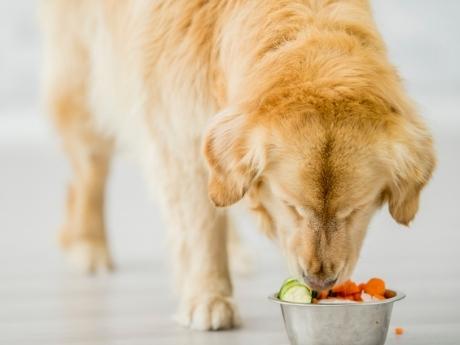
Natural Prebiotics and Probiotics, & Why Your Pet Needs Them
Share
Depending on where you shop for your pet, you probably see a lot of products that include probiotics, prebiotics, or both. They come in supplements (nutraceuticals) and many over-the-counter foods. Many people often confuse the two as one and the same, and although many products contain both, there are some essential distinctions to make when choosing what’s right for your pet.
Before we get into the different benefits of prebiotics and probiotics for pets, we should start with the fact that both have important roles to play in improved gut health and good bacteria.

Your Pet and Gastrointestinal Health
Your pet’s GI tract does more than just digest food. Gastrointestinal functions are essential for creating and maintaining overall health. Your pet’s gut is made up of a complex system of microflora, the “good” bacteria.
Unfortunately, the gut also has “bad” bacteria. This is natural in both humans and pets, which is why it’s so important to maintain that balance between good and bad bacteria. When we don’t, humans and their pets can experience many different digestive disturbances, among a wide variety of health issues if this imbalance goes unaddressed.
The very simple breakdown is this:
- Probiotics are strains of bacteria that add to the rest of the good bacteria living in your pet’s digestive and GI tract.
- Prebiotics are types of plant fiber that feed the good bacteria (probiotics). Prebiotics promote growth of the good bacteria living in your pet’s gut.
Probiotics for Your Pet
As we mentioned, gut health is not just important for digestion, but it plays a big role in your pet’s overall health. A healthy GI tract helps prevent disease and helps with digesting important nutrients that boost the immune system.
That’s why many veterinarians will recommend adding probiotics to a pup’s diet when he or she is experiencing vomiting, diarrhea, or even Irritable Bowel Syndrome. Probiotics will help soothe those digestive issues to get your pup’s gut back to balance.
Examples of probiotics to feed your pet include (but are not limited to):
- Dog-friendly Yogurt and Kefir
- Over-the-counter supplements including strains of probiotics like Lactobacillus acidophilus
- Fermented foods like blueberries and strawberries (Check out this amazing DIY recipe as a great food topper for your pup!)
Prebiotics for Your Pet
Because probiotics are so crucial to your pup’s gut health, that means you can’t leave prebiotics off the list. Think of it this way: probiotics are the workers on the frontlines of the battle for good gut health, and prebiotics provide the tools and resources for those workers to succeed. Essentially, prebiotics are the fibers that fuel your probiotics!
Here are some natural prebiotics for your pet:
- Mushrooms, which are rich in good carbs and have a ton of other benefits!
- Goat milk, which is the most digestive-friendly of all milk
- Nutraceuticals and supplements containing Larch Arabinogalactan, a prebiotic fiber that supports gastrointestinal and immune system health
At Homescape Pets, we know how important it is to go natural, which is why we always recommend natural foods and products for your pet’s holistic health. Feeding your pet organic foods means you’re providing them with as many health benefits as each food can provide. That’s why we only offer products with 3 ingredients or less, all that are organically grown.
If you’re looking for prebiotics and probiotics to help support your dog’s gut health, you should also consider Mussel Mobility to boost the benefits of both. Mussel Mobility promotes healthy digestion, provides powerful anti-oxidant and anti-inflammatory properties, and is a great and natural source of glucosamine and Omega-3, among other essential nutrients!
Yes, it’s quite possible there are supplements that can do it all! Give Mussel Mobility a try, and be sure to connect with us @HomescapePets to let us know how it’s helped your pet!
